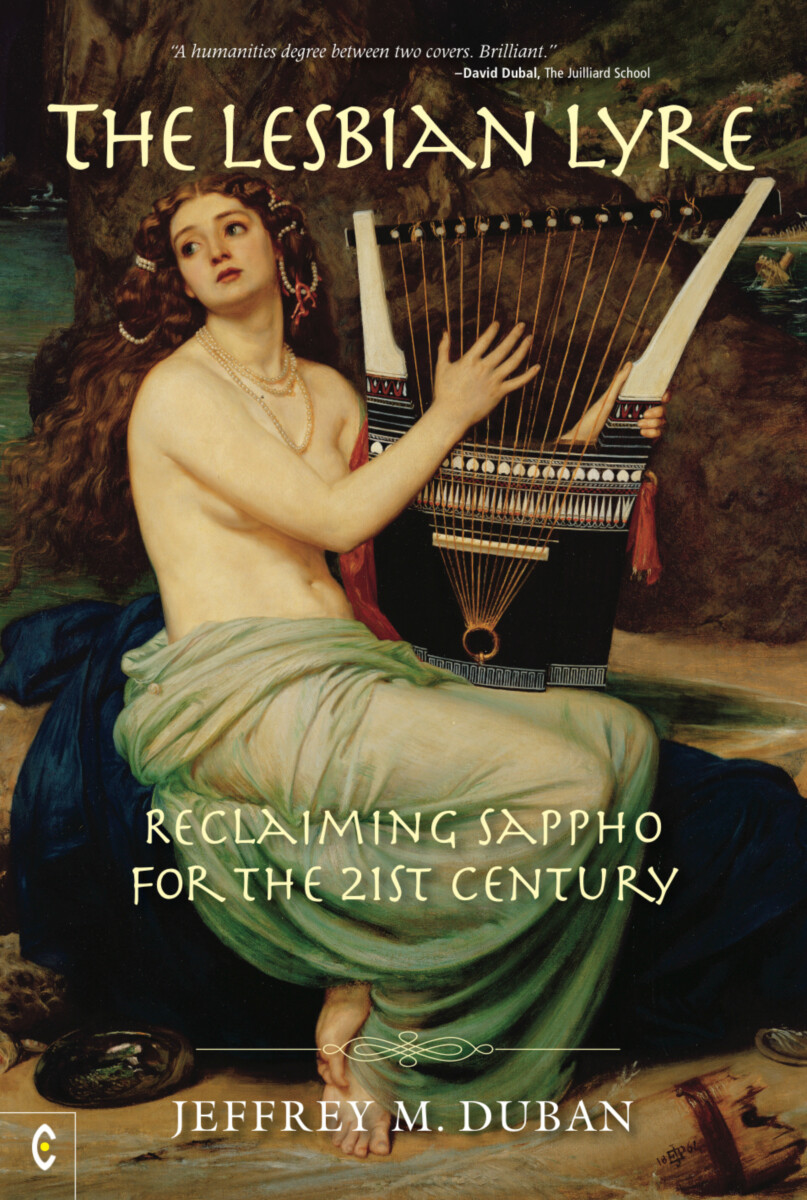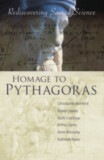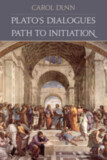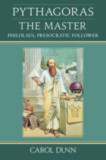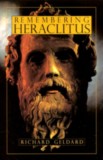The Lesbian Lyre
Reclaiming Sappho for the 21st Century
- Publisher
Clairview Books - Published
8th July 2016 - ISBN 9781905570799
- Language English
- Pages 832 pp.
- Size 6.5" x 9.5"
Hailed by Plato as the "Tenth Muse" of ancient Greek poetry, Sappho is inarguably antiquity's greatest lyric poet. Born over 2,600 years ago on the Greek island of Lesbos, and writing amorously of women and men alike, she is the namesake lesbian. What's left of her writing, and what we know of her, is fragmentary. Shrouded in mystery, she is nonetheless repeatedly translated and discussed—no, appropriated—by all. Sappho has most recently undergone a variety of treatments by agenda-driven scholars and so-called poet–translators with little or no knowledge of Greek.
Classicist–translator Jeffrey Duban debunks the postmodernist scholarship by which Sappho is interpreted today and offers translations reflecting the charm and elegant simplicity of the originals. Duban provides a reader-friendly overview of Sappho's times and themes, exploring her eroticism and Greek homosexuality overall. He introduces us to Sappho's highly cultured island home, to its lyre-accompanied musical legends, and to the fabled beauty of Lesbian women. Not least, he emphasizes the proximity of Lesbos to Troy, making the translation and enjoyment of Homer's Iliad and Odyssey a further focus.
More than anything else, argues Duban, it is free verse and its rampant legacy—and no two persons more than Walt Whitman and Ezra Pound—that bear responsibility for the ruin of today's classics in translation, to say nothing of poetry in the twentieth century.
Beyond matters of reflection for classicists, Duban provides a far-ranging beginner's guide to classical literature, with forays into Spenser and Milton, and into the colonial impulse of Virgil, Spenser, and the West at large.
“[The Lesbian Lyre] is a big book and a fine one. Duban is a man with a mission: his intention, made clear in the subtitle, is to rescue Sappho from the distortions and perversions of her text imposed by modernist poetasters of the past half century and more. The discussion ranges widely, but without superficiality, into poetry ancient and modern. It is clear that his grounding in Greek and Latin at the Public Latin School at Boston and at Brown University was thorough, so that he is competent to practice what he preaches—the translations offered in Part III are accurate and possess a certain formality. The tone is often censorious, but the many pages of reproof and repudiation rarely pall, since they are enlivened by pawky commentary.”
—George Huxley, Trinity College Dublin, Hermathena“A humanities degree between two covers. Brilliant.”
—David Dubal, The Juilliard School
“Jeffrey Duban is one of the relatively few scholars and artists standing athwart the flood of modernism and yelling stop...”
—Mark Helprin, author, A Kingdom Far and Clear: The Complete Swan Lake Trilogy
“A half-century ago Duban’s views on the translation of Greek and Latin poetry would have been non-controversial. Now they may be as incendiary as they are desperately needed.”
—Victor Davis Hanson, The Hoover Institution, Stanford University
“Jeffrey Duban’s The Lesbian Lyre is unique.... The work is magisterial in its root sense: we enjoy good teaching.”
—William Nethercut, Professor of Classics, University of Texas, Austin
“The Lesbian Lyre offers a bracing and very welcome challenge to the 20th century dominance of ‘personal voice’ translations of Greek lyric, Sappho in particular.”
—Niall Slater, Samuel Candler Dobbs Professor of Latin and Greek, Emory University, Atlanta
“...Taken as a whole, the book contains a feast of sound scholarship and challenging critical judgment.”
—Nicholas Ostler, author, Ad Infinitum: A Biography of Latin“The Lesbian Lyre by Jeffrey M. Duban offers a most stimulating discourse: it will be, for the beginning of the 21st century, a rich document added to the long list of uses and misuses Sappho has known since Antiquity, of which he, to be sure, presents examples. The author’s stance—avowed, to say the least—ever leads the reader, philologist, poet, performer or translator, or simple amateur of ancient poetry, to question—reflexively, and with renewed vigor—their epistemological, anthropological, and even political assumptions.”
—Michel Briand, University of Poitiers“Jeffrey Duban tries valiantly to revive the tradition in his ambitious, pugnacious, eccentric, sprawling new book The Lesbian Lyre: Reclaiming Sappho for the Twenty-First Century. This is not all Duban tries to do: he also provides a learned introduction to ancient Greek lyric poetry, offers translations of his favorite love poems, surveys Latin and Greek literature more generally, explains the formal aspects of classical verse, discusses translation, surveys and criticizes various translations, and explains how literature, art, Classics and everything else went wrong after World War I, with the advent of Modernism, and the inexplicable rise of the half-educated poet, critic, and charlatan Ezra Pound (1885–1972), who is ultimately to blame for the decay in modern poetry and the death of the classical tradition….
“Duban has a great deal to say; much of it is immensely valuable. The Lesbian Lyre appears old-fashioned not because Duban is a reactionary, but only because literary criticism and classical scholarship have turned so sharply leftwards that even a moderately liberal intellectual stance seems a quaint novelty....
“Jeffrey Duban seems to have been provoked into writing The Lesbian Lyre because of the recent proliferation of bad “poetic” versions of verses by Sappho of Lesbos (ca. 630–570 bc), where the translators have little or no ability to read ancient Greek, no ability to organize words into recognizable poetic form, and no knowledge of or respect for English literature. Many of these translators claim special insight into Sappho’s surviving verses by virtue of being women, even where they cannot read Sappho’s own words. Such politicized hocus-pocus goes unchallenged by classicists, who either agree with it or decline to express their dissent.”
—Quillette: A Platform for Free Thought
C O N T E N T S:
Guide to Pronunciation
Preface
PART I.
1. Greek Lyric, Greek Epic, and Old Testament: The Quarrel of Ancients and Moderns
2. Greekless Translators, Theorizing Scholars
3. Selected Lyric Poets of Antiquity: Archilochus, Alcman, Anacreon & Ibycus
4. Sappho: Antiquity’s Poetess and Ours
5. Sappho’s Eroticism
6. The Loves of Men, Gods, and Primordial Forces
7. Lesbos, Troy, and Environs: The Principal Greek Genres and Dialects
PART II.
8. Sappho and the “Lyric Nine,” an Aesthetic for Lyric Translation
9. The Aesthetic of English-language Prosody in the Translation of Classical Verse
10. Translatability: Achieving Charm and Distinction in Translation
11. Translation as the Profession of Ignorance: Mary Bernard, Willis Barnstone, and Others
12. Translations Compared
PART III.
Translations:
• Sappho
• Alcman
• Anacreon
• Archilochus
• Ibycus
PART IV.
13. Iliad, Odyssey, and Aeneid: The Epic Cycle in Progress
14. Cosmic Preservation and the Heroism of Heracles
15. Self-perpetuation and the Heroism of Troy
16. Imperishable Fame and the Evolution of Greek Epic
17. Imperishable Fame Denied: Sappho’s “Wedding of Hector and Andromache”
18. Cataclysm Averted: Homer’s Separation of Helen and Achilles
PART V.
19. Homeric and Sapphic Meter, Metric Formulae and Oral Composition, the Origins of Rhyming Poetry, Milton on Blank Verse
20. Accentuation, sound, and Word Order in Ancient Greek Poetry
PART VI.
21. Growing Latin from Greek Roots, Rome’s Imperial Vision and Its Aftermath
PART VII.
22. Equal to the Gods: Poetic Sublimity, Inner Collapse
23. Equal to a God: Form and Content in Convulsive Union
24. Frenzied Emotion, Expressive Control: Form and Content Bound
25. Modernism Wins Out: Form and Content Abandoned
26. “Freedom, Freedom, Prison to the Free”: The Obfuscatory Unfettered
27. Sappho Unbound and Boundaryless—theorized, Personalized, Politicized
28. Boundaries, Artistic Fit, and What “Art” Means and Does
PART VIII.
29. Not Making It New (or Better): Recent Iliads and Aeneids
30. So Old It’s New (and Better): The Smith/Miller Hexametric Iliad
31. On Leaving Well Enough Alone: Rejecting Lattimore for R. Fitzgerald
32. Pope’s Iliad and E. Fitzgerald’s Rubdáiyát: Pope on Chapman’s Iliad
33. Versions and Perversions of Homer: R. Fitzgerald, Fagles, and Logue
34. Ezra Pound: Damage to Sextus Propertius
Addendum
Notes
Bibliography
Index
Jeffrey M. Duban
Jeffrey M. Duban, an ardent classicist, art devotee, and classical music presenter, grew up in Boston, where he attended the prestigious Boston Public Latin School. He began studying Latin in the seventh grade and Greek in the tenth, followed by Old Testament Hebrew and Sanskrit in college. A graduate of Brown University, he obtained his PhD in classics from The Johns Hopkins University and briefly entered university teaching. Changing course, he earned his Juris Doctor (JD) degree from Fordham University and devoted himself, for the next twenty-two years, to defending academic freedom in college settings large and small. Following retirement, he returned to his first love—ancient Greek, publishing The Lesbian Lyre (2016) and The Shipwreck Sea (2019). Inspirational visits to the Greek islands of Lesbos, Chios, Syros, and Crete further cemented his determination to publish Homer’s Iliad (2024), which he translated classically—critically, free of colloquialisms, and truer to Homer’s own idiom and elevated diction. Moreover, Jeffrey’s varied musical interests have led to a collaboration with contemporary Greek-Canadian composer Constantine Caravassilis on his double album, From Sappho’s Lyre. In addition to liner notes, commentary, and translations of Sappho, the album includes “5 Duban Songs” set to Jeffrey’s own poetry, published in The Shipwreck Sea. Jeffrey and his wife Jayne, his beloved editor and collaborator, live in New York City.


